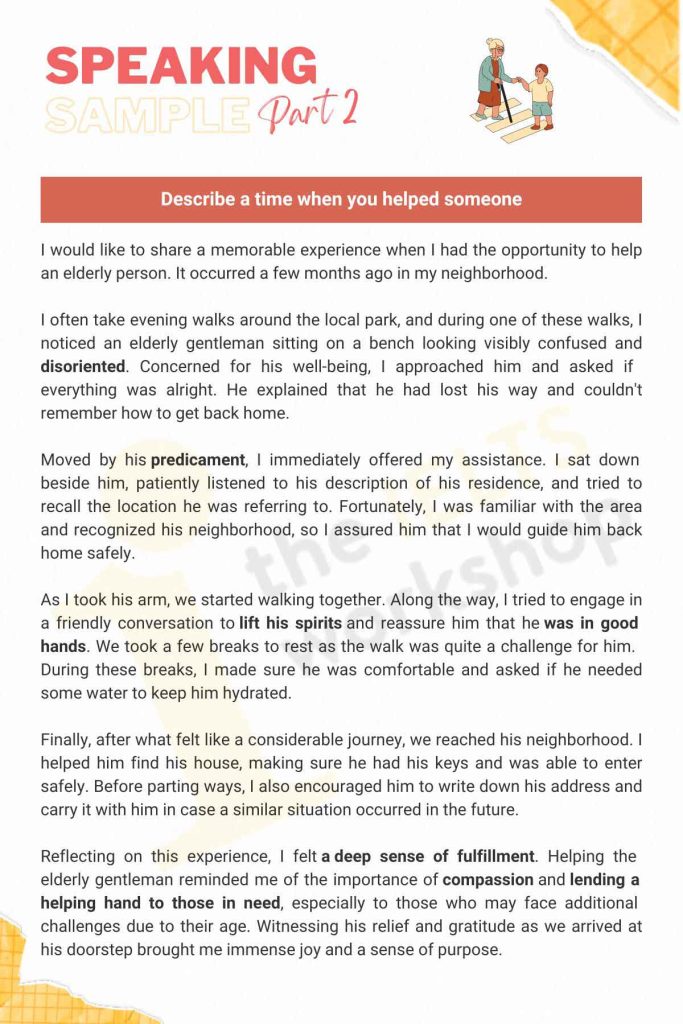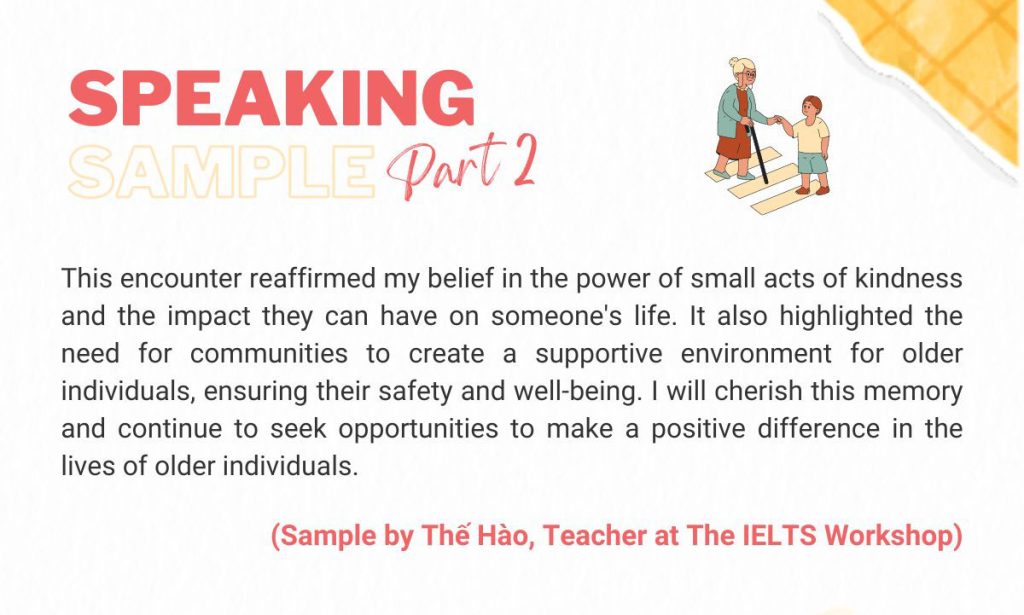Đến với chuyên mục giải đề IELTS Speaking kỳ này, cùng tham khảo cách giải chủ đề: “Describe a time when you helped someone” qua bài mẫu của thầy Thế Hào đến từ The IELTS Workshop nhé.
Part 2: Describe a time when you helped someone
Describe a time when you helped someone
You should say:
Where you helped him/her
Why you helped
How you helped
And explain how you felt about it
Dưới đây là bài mẫu cho topic “Describe a time when you helped someone”.
1. Bài mẫu (Sample)


2. Từ vựng (Vocabulary)
- Disoriented (adj): bị mất phương hướng
- Predicament (n): tình huống khó khăn
- Lift SO’s spirits: khiến ai đó vui vẻ, tự tin hơn
- Be in good hands: được chăm sóc chu đáo
- A sense of fulfillment: cảm giác được hoàn thiện
- Compassion (n): lòng trắc ẩn
- To lend a helping hand to those in need: Để giúp đỡ những người cần giúp đỡ
Xem thêm:
- Describe a time when you helped a friend | IELTS Speaking Part 2
- Bài mẫu IELTS Speaking Part 2+3 – Topic: Helping a child
Part 3
Should people be very kind when they help others?
Should children be taught to be kind to others?
Should parents help their kids with their homework?
What kind of advice should parents give to their children?
Should parents give children advice? Why?
Can kids provide any help to parents?
1. Should people be very kind when they help others?
In my opinion, it is highly important for people to exhibit kindness when helping others. Kindness is a powerful catalyst, which fosters positive connections and nurtures a sense of empathy and compassion within society.
When individuals approach helping others with kindness, it creates a warm and supportive environment. Kindness can alleviate the burdens and challenges faced by those in need, while also uplifting their spirits and instilling a sense of hope. It allows individuals to feel valued and understood. Moreover, acts of kindness have a reciprocal effect. When people experience kindness, they are often inspired to pay it forward, creating a chain of positive actions.
However, I also believe that kindness should be expressed in a manner that is respectful and culturally appropriate. Different cultures may have varying norms and expectations when it comes to offering assistance. It is crucial to navigate such situations with sensitivity and respect for the values and boundaries of others.
- Catalyst (n): chất xúc tác, nhân tố quan trọng
- A sense of empathy: sự cảm thông
- Alleviate (v): giảm thiểu
- Instill (v): thấm nhuần
- Reciprocal effect: hiệu ứng tương hỗ
- Pay it forward: lan truyền việc thiện
2. Should children be taught to be kind to others?
Without a doubt, it is essential to teach children to be kind to others. Instilling kindness as a core value in children is crucial for their social and emotional development. There are several reasons why I think this practice is so important.
First, teaching kindness helps children develop empathy. By encouraging children to consider the feelings and perspectives of others, we nurture their ability to understand and share the emotions of those around them. This fosters compassion and a genuine concern for others’ well-being.
Second, kindness lays the foundation for positive relationships. When children learn to be kind, they acquire valuable communication skills and conflict resolution strategies. They understand the importance of treating others with respect and empathy, which leads to healthier and more fulfilling connections with their peers and the wider community.
Furthermore, promoting kindness creates a positive environment in schools and communities. When children are nice to one another, it reduces instances of bullying, exclusion, and discrimination, which ultimately creates a more inclusive and harmonious society.
- social and emotional development: sự phát triển cảm xúc và xã hội
- Genuine (adj): thật sự
- Well-being (n): tâm sinh lý
- conflict resolution strategies: các chiến lược giải quyết mâu thuẫn
- a more inclusive and harmonious society: một xã hội bao dung và hoà thuận hơn
3. Should parents help their kids with their homework?
Well, I’m a bit on the fence right now. However, I believe that parents could play a pivotal role in supporting their children’s educational endeavors. I mean, parental involvement in homework can be beneficial to some extent.
First, by providing guidance and explanations, parents can strengthen the parent-child bond. Spending time together on homework creates opportunities for open communication and shared experiences. This engagement allows parents to gain insights into their child’s strengths, weaknesses, and educational needs.
Moreover, parental support can create a positive learning environment at home. By engaging in homework activities together, parents have the opportunity to demonstrate the value of education and collaboration for their children. This environment can cultivate a passion for learning and encourage children to take pride in their academic achievements.
However, it is important for parents to be mindful of their role and avoid taking over the homework entirely. Children should be encouraged to think for themselves and complete tasks to the best of their abilities. Parents should only provide sufficient guidance and support while respecting their child’s autonomy and fostering a sense of responsibility. If done right, parents can promote self-reliance, critical thinking, and problem-solving skills for their beloved child.
- On the fence: đang phân vân
- Endeavors (n): sự nỗ lực
- play a pivotal role: đóng vai trò then chốt
- to some extent: ở một mức độ nhất định
- gain insights: có nhiều hiểu biết sâu sắc
- Cultivate (v): nuôi dưỡng
- Autonomy (n): tính tự chủ
- Self-reliance (n): sự tự chủ
- critical thinking: tư duy phản biện
- problem-solving skills: kĩ năng giải quyết vấn đề
4. What kind of advice should parents give to their children?
That’s interesting! Let me see. Well, I can hardly give you a satisfactory answer for this, as I’m not yet a father or mother. However, there are several key areas where I suppose that parents can offer advice to support their children’s growth and well-being.
One of the most important pieces of advice that parents can guide their children is about setting goals and developing the perseverance to achieve them. By teaching the value of hard work, resilience, and determination, parents will empower their children to overcome obstacles, stay focused, and pursue their dreams with sheer commitment.
Additionally, parents can also provide guidance on decision-making and problem-solving skills. Teaching their children to think critically, consider consequences, and be responsible for their choices will equip them with essential life skills to tackle challenges effectively and become a productive member of society.
- Perseverance (n): tính nhẫn nại
- a productive member of society: thành viên có ích có xã hội
5. Should parents give children advice? Why?
Definitely, parents should always be the trustworthy advisors for their offspring. As parents possess a wealth of life experience and stories, they can share valuable lessons with their children through their own successes and failures. This can help the children to figure out an idea about what their future life should look like and make informed decisions even when they are still young and inexperienced.
Another reason I can think of is that parents are those who have a deep understanding of their children’s strengths, weaknesses, and aspirations. They are in a unique position to offer personalized advice to their children’s specific needs and goals. This individualized guidance can empower children to make choices that align with their interests and abilities, ultimately leading to greater fulfillment and success.
Nevertheless, parents should create an open and non-judgmental environment where children feel comfortable expressing their thoughts and opinions. It is of importance to foster critical thinking and allow space for exploration for the child while making sure that he or she is still benefiting from parental help.
- figure out: tìm ra
- specific needs and goals: nhu cầu và mục tiêu cụ thể
- non-judgmental environment: môi trường không phán xét
6. Can kids provide any help to parents?
From my humble experience, there are some meaningful ways that children are capable of assisting their parents.
One of the most notable aspects that children can contribute is keeping pace with their main responsibilities like studying or doing household chores. By achieving academic successes or taking on age-appropriate tasks such as tidying their rooms, helping with meal preparation, or assisting with cleaning, children not only make their parents proud but also develop a sense of responsibility and independence.
Furthermore, children can lend a helping hand in caring for younger siblings or elderly family members. Whether it’s playing with their younger siblings, assisting with their homework, or spending quality time with grandparents, children can alleviate some of the caregiving commitments that parents have, allowing them to have moments of respite.
And more importantly, in today’s digital age, children often possess proficiency in technology and can teach their parents how to use various gadgets, navigate social media platforms, or explore new software applications. This exchange of knowledge will strengthen the parent-child bond and enhance the parents’ technological literacy.
- keep pace with: theo kịp với
- academic successes: thành công học thuật
- moments of respite: giây phút thư giãn
- Proficiency (n): sự thông thạo
- parent-child bond: tình cha mẹ con cái
- technological literacy: trình độ kỹ thuật số
Bài mẫu bởi thầy Thế Hào – Giáo viên The IELTS Workshop HCM
Trên đây là bài mẫu cho topic: Describe a time when you helped someone. Các bạn có thể tham khảo các bài mẫu IELTS Speaking khác của The IELTS Workshop tại đây!
Tham khảo ngay khoá Senior của The IELTS Workshop để có thể tìm hiểu thêm các chiến lược làm bài IELTS Speaking cũng như phương pháp xây dựng câu trả lời hiệu quả bạn nhé.









